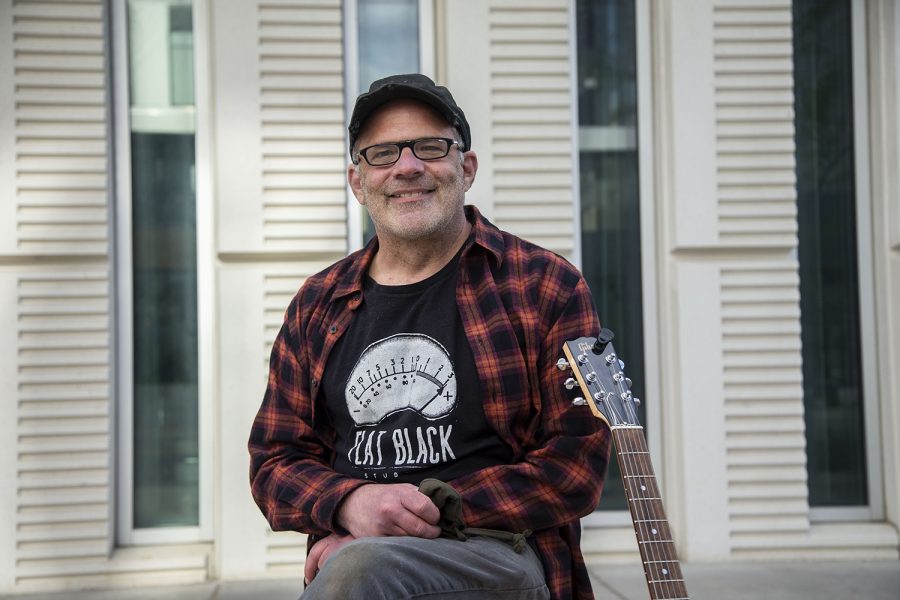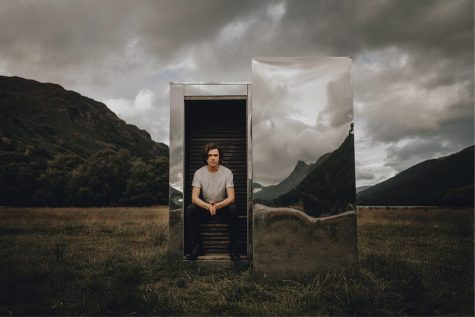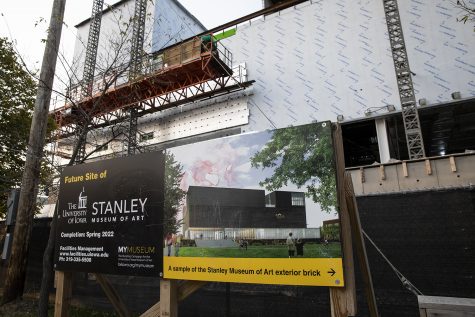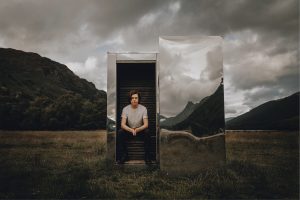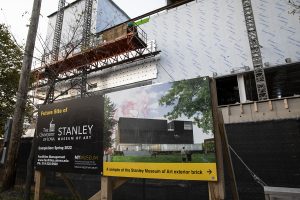‘A pandemic project:’ UI staff member creates album reflecting past year spent at home
When the COVID-19 pandemic took full swing, UI College of Liberal Arts Strategic Communications Director Nic Arp took the opportunity to turn his spare bedroom into a recording studio and self-produced an album, The Crossing.
University of Iowa College of Liberal Arts Strategic Communications Director and musician, Nic Arp, poses for a portrait outside of the Voxman Music Building at the University of Iowa on Tuesday, May 4, 2021. Arp produced an alternative folk album this year called “The Crossing.”
May 5, 2021
This is the crossing, there is the shore
We will not be who we were anymore
We may remember who we might have been
But we will not pass back that way again
These lyrics are from UI College of Liberal Arts Strategic Communication Director Nic Arp’s title track on his new album, The Crossing — an acoustic-based and self-produced alternative folk album Arp created from his home office over the course of the COVID-19 pandemic.
The album reflects the previous year, one Arp viewed as a nationwide “crossing.” He explained how what began as a song about individual migration — the feeling of uprooting one’s life and heading somewhere new — throughout the year alchemized into a song of societal progression.
“This has been a really intense year for everyone on every level in our individual lives. In our workplaces, in our schools, in our communities, and as a nation,” Arp said. “And, you know, we’ve dealt with not just the pandemic, but the murders of George Floyd and Breonna Taylor, and so many other people, and we’ve had to deal with a treasonous president.”
Themes of loneliness, forward movement, and wistfulness prevail, and are accompanied by impassioned background vocals sung by Arp’s friend and local artist Leah Meinel.
“In these times when there is no one, on whom I can depend, It’s just me, and the moon, and a tune in my head,” Arp sang.
RELATED: The art of ‘good sound’: local producer Capel Howorth gives the ins and outs to music production
The album retains this perceptive and often retrospective gaze throughout. Aching and loneliness teems through the words in the first track.
After spending his childhood in Iowa City, Arp went to college at Evergreen State College in Olympia, Washington.
“Evergreen was a hippie school and I was a hippie,” Arp said. “So it fit great. I mean, at the time when, if there were Grateful Dead shows within 1000 Miles, half the campus emptied.”
Grateful Dead was one of the many bands Arp mentioned when talking about his influences, along with Bob Dylan, The Beatles, and Camper Van Beethoven. But Arp maintained that he’s influenced by every song he’d ever heard, drawing inspiration from psychedelic hip hop, late ‘80s and early ‘90s music, punk rock, and even show tunes.
“I like any genre of music, and can find inspiration in it, as long as it’s done with heart and soul,” Arp said.
Arp took his first dive into the music scene when in Olympia. There, he started a band with his close friends. Arp would write the lyrics, and his friend wrote the music. They played gigs around the city. Occasionally, he’d borrow percussion instruments from Evergreen’s instrument library.
“I was the lead singer in the band,” he said. “[I] had very little idea of what I was doing but it was a lot of fun.”
Arp stayed in Olympia for 13 years, singing for the band and waiting tables. At 30, he returned to Iowa City.
“It was a homecoming for me, really, I love it here,” Arp said. “I always kind of hoped I would move back here, and it just kind of worked out that I did.”
Upon his return, Arp received a master’s degree in journalism from the University of Iowa. He also taught himself guitar, as his bandmates had all departed to different parts of the country. He now lives a double life as a musician and university staff member, directing strategic communications for the College of Liberal Arts.
“You know, I have never tried to make a living off music — that’s never been a goal of mine, which is both good and bad in terms of fitting music into my life,” Arp said. “On the one hand, I developed a whole other career that I enjoy and that has taken the pressure off having to make money from music, but on the other hand, it can be awfully hard to find time. My job is very very demanding. And so I end up making music at weird hours of the night.”
RELATED: Producing in a pandemic: local artists release new music
The Crossing was Arp’s first project produced and written completely by himself. Once quarantine hit full swing, Arp converted his spare bedroom into his office, and then doubled his new office into a recording studio. Arp spent long days in the bedroom-office studio, “monkeying around” with a harmonica and teaching himself bass and audio engineering.
Arp said recording his own music introduced a wealth of new possibilities. Not only was time on his side, but he was also introduced to all kinds of new processes — drum programming, sound sampling, creating loops — which completely transformed his songwriting process from his previous three albums.
Where Arp stands out most as a songwriter is in his lyrics. The final track on the album reads like a conversation between old friends. It’s a warm and energetic tune — a track where you can feel the Dead’s influence in Arp’s guitar and the harmonica has its own spirit.
I got a bigger house when I got a brand-new job
Then I got me a big promotion, I just keep climbing to the top
I got rid of my old beater, I traded in for a new car
But it’s been so goddamn long since I picked up my guitar.



